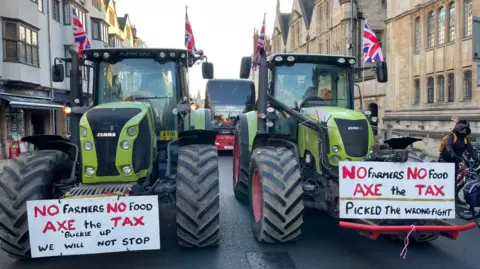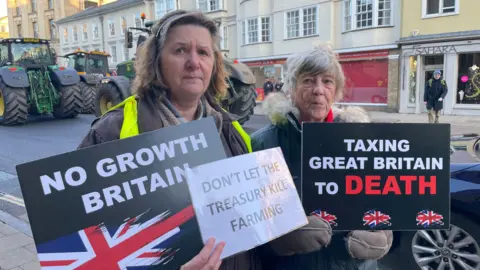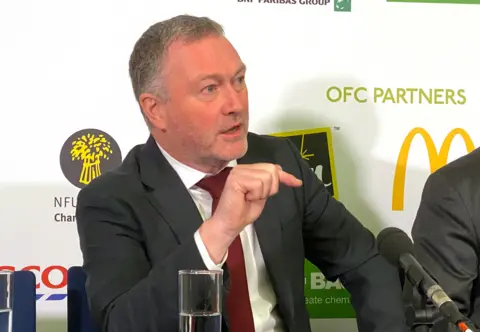Tractor protest as minister pledges farmers 'new deal'
 BBC/Malcolm Prior
BBC/Malcolm PriorProtesting farmers angry at inheritance tax changes have tried to disrupt a minister's speech outlining the government's vision of a "new deal" for UK agriculture.
About 40 tractors rolled into the streets of Oxford city centre blaring their horns, as Environment Secretary Steve Reed addressed a national farming conference.
In his speech, Reed he was "sorry" decisions had upset farmers but argued "stable finances are the foundation of the economic growth needed".
The comments came as he set out the government's 25-year plan to make farming more profitable.
NFU president Tom Bradshaw said farmers "are worried about making it to the end of 2025, never mind what happens 25 years down the line".
 BBC/Malcolm Prior
BBC/Malcolm PriorOutside the conference, protest organiser Caroline Graham told the BBC that the government's current policies were "crucifying" farmers.
Reed's speech was focused on the future profitability of domestic food production, while farmers remain angered by changes to agricultural inheritance tax announced in the budget.
From April 2026, inherited agricultural assets worth more than £1m, which were previously exempt, will be liable to the tax at 20% - half the usual inheritance tax rate.
Many farmers argue that while they are asset rich - for example, in terms of their land and livestock - they are cash poor and the changes would mean they would have to sell up to be able to pay the tax.
Mrs Graham, a widowed farmer, from Berkshire, said: "If those taxes had existed when my husband died I would have had to sell the farm.
"The government cannot do what they're doing. They have hit us at every angle.
"It's not just the inheritance tax. It's the business tax. It's the crops in the ground. Everything they are doing is crucifying us."
She criticised Reed, who was speaking inside the conference to a paying audience, saying: "It's about time he came and stood up for what he is saying.
"He should be on farms listening to genuine farming people."
Inside the conference, as tractors blared their horns outside, Reed repeated Labour's claim of a £22bn deficit left by the last government. He told delegates: "We were shocked by the size of the financial black hole we were left to fill.
"I'm sorry that some of the action we had to take shocked you in turn, but stable finances are the foundation of the economic growth needed."
Pressed by reporters, Reed said he was apologising for having "to take decisions that are very difficult for the sector because of what we inherited".
In his speech, Reed said the government would offer a "new deal for farmers" that would help them become more profitable.
Measures under the deal include delivering Labour's manifesto pledge to ensure that 50% of food in schools, hospitals, army bases and prisons paid for with public sector money would come from local farms or would be produced to high environmental standards.
Reed told the BBC that could be worth £2.5bn to domestic food producers, adding: "What I am announcing today are hard measures that will put money directly into farmers' pockets for the hard work they put in to put food on all of our tables."
 PA Media
PA MediaThe government is also pledging to cut planning red tape to make it quicker for farmers to build barns and other infrastructure needed to boost food production and help them diversify their businesses with farm shops and holiday lets.
Reed also said that the government would make it easier for farm businesses to provide energy from on-site solar panels and wind turbines to the energy grid.
The measures were given a cautious response from the NFU, with its president Mr Bradshaw saying: "If farmers were really confident about their future they would think actually there is quite a bit contained within this that we like - planning reform, cutting red tape, making sure that food production is profitable.
"The problem is the industry is on an absolute knife-edge."
He added that the government's plan "fundamentally fails to recognise that the industry is in a cash flow crisis with the lowest farmer and grower confidence ever recorded".
"Many are worried about making it to the end of 2025, never mind what happens 25 years down the line," he said.
